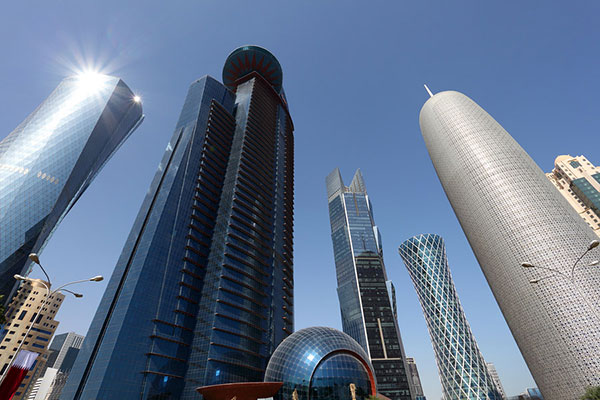Qatar’s economy will grow this year at the slowest pace since 1995, according to international economists, as the impact of the Arab boycott is felt on trade and investor confidence, a report said.
Gross domestic product will grow 2.5 per cent in 2017 and 3.2 per cent next year, compared with 3.1 per cent and 3.2 per cent respectively, reported Emirates news agency Wam, citing a survey published by Bloomberg recently.
Economists now expect a budget deficit of 5.1 per cent of GDP this year, up from 4.6 per cent, while the forecast for inflation dropped to 2.2 per cent from 2.5 per cent.
"Even before the diplomatic crisis with regional powers, it looked like Qatar’s non-energy economy would slow," said William Jackson, senior economist for emerging markets at Capital Economics. "The early signs are that the sanctions dealt a damaging blow to Qatar’s economy in June. The impact appears to be temporary, but it will still result in weaker growth."
The country has been forced to tap into its foreign currency reserves and borrow from debt markets to support its economy, which is facing the prospect of posting a fiscal deficit. Its sovereign wealth fund has been compelled recently to reduce its stake in Credit Suisse to 4.94 per cent.
While global credit rating agency Standard & Poor’s has downgraded the sovereign ratings of Qatar and changed the outlook of some of the leading corporate entities with negative implications, other rating agencies have warned of potential rating downgrade and or change in outlook to negative.
Moody's Investors Service has recently changed the outlook on Qatar's rating to negative from stable, saying the key driver for the outlook change to negative is the economic and financial risks arising from the Arab boycott.
The boycott is squeezing the tourism sector as well, as Doha's hotels have seen steep falls in their occupancy rates. Elsewhere in the tourist sector, hotels, restaurants and other facilities have had to find new sources of services and goods, in some cases, at higher cost, due to the boycott, said Rashid Abu Baqer, senior director at TRI Consulting in Dubai, to Reuters.
Finance & Capital Market
Qatar economy growth slowest since 1995: report

- Similar Stories

Abu Dhabi issues $5bn USD-denominated bonds

Emirates NBD Q1 profit surges 67% to record $1.82bn

Dubai FinTech Summit to take place on May 6

IMF launches new regional office in Saudi Arabia

Saudi’s Fakeeh Care Group to float 21.47pc stake through IPO

ADGM and Hacken tie up to elevate blockchain security

Al Mal Capital REIT completes $49m rights issue

ADQ acquires 49pc stake in Plenary Group

Bahrain EDB hosts delegation from Monaco

Network obtains SVF licence from UAE Central Bank

Core International to invest $1.36bn more in UAE

Dubai World Trade Centre cluster names new finance head

UAE banks told to defer loan repayment for rain-hit

Beyon Money - Medical.BH partnership to benefit customers

Africa 'needs $277bn to mitigate climate crisis'

Kuwait’s banking sector witnesses robust growth in 2023

Shuaa reaches deal with noteholders for bond term amendment

Global economic growth set to slow to 2.6pc in 2024: UNCTAD

MoF launches 'digital public consultation' on R&D tax relief

Fortis secures $20m in Series A funding round

Saudi investment funds' assets surge to $33bn in Q4

ADGM wins 'Most Trusted Financial Centre Brand’ award

Adnic acquires 51% of Allianz Saudi Arabia stake

Emirates Islamic concludes debut $500 million financing facility

SNB Capital closes cross-border insurance M&A deal

GCC insurers’ top-line growth to be 5pc-15pc in 2024: S&P

Dubai Investments shareholders approve 12.5pc dividend

Every dirham lost to fraud in UAE costs firms AED4.19: study

Carbon markets to play ‘critical role in decabonisation’

Sukuk market set to grow; GCC DCM to cross $1 trillion
